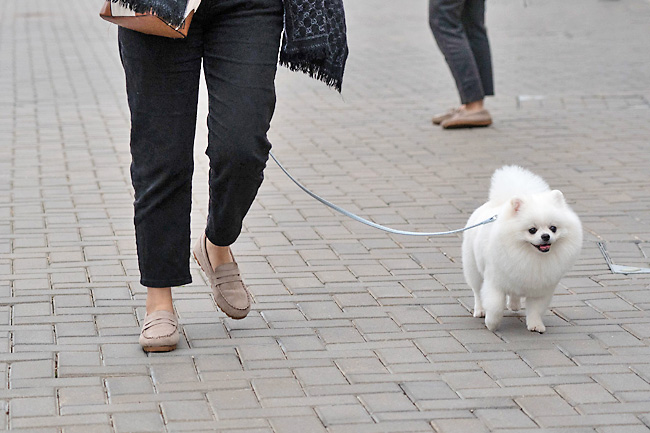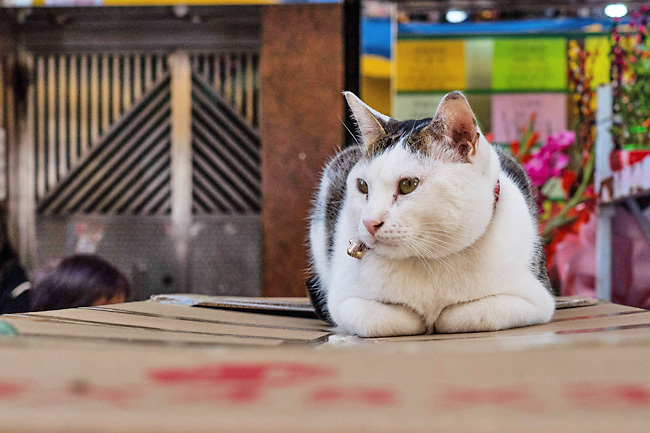HONG KONG (AFP) – Bags packed and ready to go, Hong Kong house cats Teddy and Newman were all set for leaving on a private jet plane – an expensive last resort for their owners as the city piles on pandemic restrictions.
China remains one of the few places left in the world pursuing a strict “zero-COVID” policy, transforming Hong Kong, a one-time aviation hub, into a city where thwarted travel plans and cancelled flights are the norm.
The emergence of the highly transmissible Omicron variant in recent weeks has also seen authorities ban incoming flights and transit passengers from numerous countries – upending plans for the already limited number of carriers still entering the city.
For Lee, a Hong Konger emigrating to Britain, it also meant that ferrying his beloved elderly cats Teddy and Newman out by commercial airline was no longer possible.
“It is an exceptional situation,” Lee told AFP ahead of last week’s flight, providing only his family name.
“If it was just my wife and I travelling, of course we wouldn’t take a private jet. It’s only because of our cats.”


Typically favoured by the ultra-rich, private planes are now a mode of transport desperate pet owners are turning to when departing the increasingly isolated city.
Animal travel company Pet Holidays said December’s flight suspensions alone left 3,000 to 4,000 cats and dogs stranded.
“No amount of money can buy them a seat” on a commercial flight, said the company’s pet emigration consultant Fanny Liang.
For a chartered private jet, an all-inclusive package for a house cat – and their human – runs to about USD23,100 at Pet Holidays, though Liang said the costs vary based on the animal’s size.
Once an international gateway, Hong Kong’s staunch adherence to mainland China’s “zero-COVID” strategy has disincentivised travel, including among its well-heeled finance community, with long mandatory quarantines in expensive hotels. Earlier this month, the government ordered a mass cull of pet store hamsters and other small mammals after one tested positive for COVID-19, adding fresh uncertainty for pet owners.
More than 40 per cent of foreign residents said they are likely to leave the city due to the travel and COVID restrictions, according to an American Chamber of Commerce survey.
Over 25 per cent of companies said they were considering relocating offices.
The impact of December’s flight suspensions was immediate for founder of private aviation company Top Stars Air Olga Radlynska, who said she now receives dozens of phone calls from frantic pet owners.
“This year in January, I can see that people have become desperate, and they are leaving,” she said. “Every flight is one-way only.”
Over the past year, her clientele has shifted from the ultra-rich travelling for pleasure to departing pet owners trying to relocate their “fur babies”.
Top Stars Air – which has a starting price of USD19,700 for one pet and its owner – last year chartered an average of two private jets a month.
For February, Radlynska said she already had five flights planned to London, Singapore and Los Angeles.
To meet the costs of a privately chartered jet, pet owners are also flocking to Facebook groups to discuss common flight routes, hoping to corral others to help alleviate the hefty fee.
“I’m wondering if anyone is aware of a jet leaving from HK (Hong Kong) to the UK (United Kingdom) next month? I’m trying to get two French Bulldogs home,” said one on January 13, posting a fingers-crossed emoji.
The jump in departing residents has also coincided with an uptick of abandoned dogs, said Hong Kong Dog Rescue communications manager Eva Sit.
“We definitely think the emigration wave is part of the reason,” she told AFP, citing a 48 per cent increase in canines rescued in 2021.






